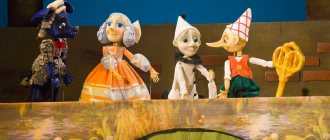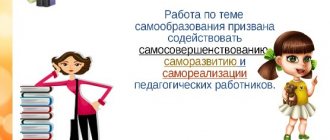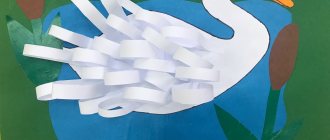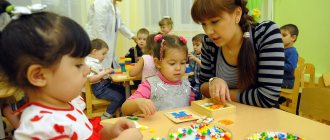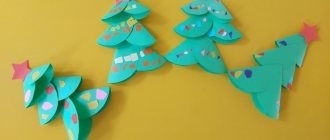Preparatory group. Senior preschool age. Children 6-7 years old
Self-education program “Development of speech of senior preschool age children through play activities” Educator: Kolpakova E.I. 2022 – 2022 academic year d. Goal: to study the ways, methods and techniques of activating the speech of preschool children, to unite the efforts of teachers and...
Self-education of the teacher of the preparatory group “Theatrical activities as a means of developing the speech of preschoolers” Self-education of the teacher of the preparatory group on the topic “Theatrical activities as a means of developing the speech of preschoolers”
Children's whole life is filled with play. Every child wants to play their role. Teach a child to play, take on a role and act, at the same time...
Work plan for self-education in a preschool group on the topic: “Development of coherent speech”
| April - | Continue work on developing children’s coherent speech: carry out breathing and articulation exercises. Play didactic, active, musical, round dance, theatrical games that took place in previous months. | Conversations with parents: “The role of descriptive stories in expanding children’s vocabulary.” |
| May | Continue to retell and compose stories and fairy tales. Continue to conduct consultations and individual conversations for parents. | Showing the fairy tale “Teremok” to children of the middle group. |
Used Books:
1. Alekseeva M.M., Ushakova O.S. Interrelation of tasks of speech development of children in the classroom // Education of mental activity in preschool children. - M, 2003. - p.27-43.
2. Anishchenkova E.S. Finger gymnastics for the development of speech in preschoolers. – AST, 2011. – 64 p.
3. Anishchenkova E.S. Speech gymnastics for the development of speech in preschoolers. – Profizdat, 2007. – 62 p.
4. Boguslavskaya Z.M., Smirnova E.O. Educational games for preschool children. – M.: Education, 2004. – 213 p.
5. Bondarenko A.K. Didactic games in kindergarten: A manual for kindergarten teachers. - M.: Education, 2005. - 160 p.
6. Boyko E.A. We learn to build sentences and tell stories. Simple exercises for the development of speech in preschoolers. – Ripol Classic, 2011. – 256 p.
7. Borodich A.M. Methods of speech development for preschool children. - M.: Education, 2004. - 255 p.
8. Raising children through play / Compiled by A.K. Bondarenko, A.I. Matusik. – M.: Education, 2003. – 136 p.
9. Gerbova V.V. Working with plot paintings // Preschool education - 2005. - N 1. - p. 18-23.
10. Gerbova V.V. Speech development in kindergarten // Library “Programs for education and training in kindergarten”. – Mosaic-Synthesis, 2010. – 56 p.
11. Gerbova V.V. Composing descriptive stories // Preschool education. - 2006. - N 9. - p. 28-34.
12. Elkina N.V. Formation of speech coherence in children of senior preschool age: Author's abstract. dis... cand. ped. Sci. - M, 2004. - 107 p.
13. Ershova E.B. We speak correctly. Games and tasks for speech development in preschoolers // Speech therapist lessons. – Astrel, 2011. – 64 p.
14. Kosinova E.M. Gymnastics for speech development. – M.: Eksmo LLC, 2003.
15. Tikheyeva E.I. Children's speech development. / Ed. F. Sokhina. - M.: Education, 2005. - 159 p.
16. Ushakova O.S. Work on the development of coherent speech in kindergarten (senior and preparatory groups for school) // Preschool education, 2004. - N 11. - p. 8-12.
17. Shukeylo V.A. 90 exercises for the development of speech in preschoolers // Getting ready for school. – Litera, 2009. – 96 p.
Long-term plan for teacher self-education
Municipal budgetary preschool educational institution "Kindergarten "Fairy Tale"
Work plan for self-education on the topic: “Fiction as a means of comprehensive development of a preschooler.”
Educator:
M. V. Oreshkina
2017
Relevance of the topic
Everyone knows that fiction serves as an effective means of mental, moral and aesthetic education of children and has a huge impact on the development and enrichment of a child’s speech.
Educating a growing person by introducing him to book culture is an important pedagogical task. Through fiction, a child comprehends the values without which the spiritual life of society and the individual is impossible.
Currently, the problem of introducing preschool children to fiction is relevant. Almost every family has a computer, the Internet, television, and parents do not consider it necessary to read to their children. In this regard, pedagogy faces the problem of rethinking the value guidelines of the educational system, especially the system of preschool education. And here mastering the folk heritage, which naturally introduces the child to the basics of fiction, becomes of great importance.
As an analysis of the practice of introducing children to fiction has shown, in the upbringing of preschool children, familiarity with fiction is used insufficiently, and only its superficial layer is affected. In addition, there is a public need for the preservation and transmission of family reading. Educating preschoolers with fiction not only brings them joy, emotional and creative stimulation, but also becomes an integral part of the Russian literary language.
When working with children, turning to fiction is of particular importance. Nursery rhymes, chants, sayings, jokes, shifters, etc. that have come down from time immemorial, best reveal and explain to a child the life of society and nature, the world of human feelings and relationships. Fiction develops a child’s thinking and imagination, enriches his emotions.
It should be remembered that fiction is the main source of education, promotes the development of imagination, develops speech, and instills love for the Motherland and nature.
Fiction reveals and explains the life of society and nature, the world of feelings and relationships. Also, reading works of fiction contributes to the development of the child’s thinking and imagination, enriching the child with emotions.
Do not forget that a book is, first of all, a source of knowledge. From books, children learn a lot about the life of society and nature. But the ability to perceive a work of art and elements of artistic expression does not come to a child by itself; it must be developed and educated from childhood.
One of the main values of reading fiction is that with its help an adult can easily establish emotional contact with a child.
It is especially important to convey to modern parents the importance of a book on a child’s development.
Hypothesis.
Planning and conducting various events with participants in educational relations using fiction, the use of techniques aimed at analyzing works of fiction creates conditions for the comprehensive development of children, in particular: the development of the child’s creative abilities, the formation of universal values and a culture of speech in communication.
The purpose of the work on the topic of self-education:
create conditions to ensure the comprehensive development of children of senior preschool age through the formation of a sustainable interest in fiction.
Tasks:
— analyze methodological literature on this topic;
- improve your professional skills.
- compile a card index of dramatization games using literary texts in order to develop children's speech, imagination, and creative abilities.
— to develop a series of observations in nature for preschool children using literary texts that contribute to the development of a positive aesthetic attitude towards a work, the ability to feel the figurative language of poetry, and the development of artistic taste.
- create conditions for aesthetic development through replenishment of the subject-development environment (book corner).
-contribute to the formation of a holistic picture of the world, including primary value ideas;
-contribute to the introduction of children to verbal art;
- to form an interest in fiction, to ensure the assimilation of the content of works and emotional responsiveness to it;
-involve parents in introducing children to fiction in the family;
— to generate parents’ interest in working together in this direction;
Expected result:
A plan for studying methodological literature was drawn up and analyzed;
a series of observations in nature has been developed for preschool children using literary texts;
a card index of dramatization games has been compiled;
The subject-development environment has been replenished (book corner).
Children:
are interested in fiction, use literary speech in communication, treat books with care;
have an idea about the family, about the small Motherland, about gender;
They independently compose stories on certain topics, compose quatrains, and dramatize excerpts from works.
Parents:
regularly use reading works of fiction in everyday life;
show interest in interacting with the teacher and children.
Plan
work on the topic of self-education
Stage 1. Preparatory (identification)
| № | The content of the work | Implementation deadlines |
| 1 | Determination of a topic for summarizing work experience, justification of its relevance, need for consideration | September |
| 2 | Setting goals and work objectives | September |
| 3 | Proposing a hypothesis | September |
Stage 2. Analytical (study)
| № | The content of the work | Implementation deadlines |
| 1 | Drawing up a work plan for self-education | September |
| 2 | Conducting an examination of children on a problem of interest (diagnosis) | September |
Stage 3. Organizational (generalization)
| № | The content of the work | Implementation deadlines |
| 1 | Theoretical part:
| During a year October |
| 2 | Practical part:
| In current of the year During the year April november in current of the year |
Stage 4. Final (implementation)
| № | The content of the work | Implementation deadlines |
| 1 | Registration of the results of examination of children on the problem | During the year |
| 2 | Formalization of work experience:
| May February in current of the year |
Stage 5. Presentation (distribution)
| № | The content of the work | Implementation deadlines |
| 1 | Speech at the pedagogical council:
| May |
| 2 | Providing work experience in the methodological room of electronic material on speech development | May |
| 3 | Preparation of material for publication on the preschool educational institution website | In current of the year |
| 4 | Participation in distance teaching competitions | In current of the year |
Work plan for the year
| Chapter | Deadlines | The content of the work | Practical solutions |
| Studying methodological literature | September – May | 1. Bogolyubskaya M.K., Shevchenko V.V. Artistic reading and storytelling in kindergarten. Ed. -3-in. M., "Enlightenment", 1970. 2. Gerbova V.V., Introducing children to fiction. Program and methodological recommendations. Mosaic-Synthesis. Moscow, 2008. 3. Gurovich L. M., Beregova L. B., Loginova V. I., Piradova V. I. Child and book: St. Petersburg: 1999. 4. Karpinskaya N. S. Artistic word in raising children. M., “Pedagogy”, 1972. 5. Naydenov B.S. Expressiveness of speech and reading. M., “Enlightenment”, 1969. 6. Ushakov O. S., Gavrish N. V. Let’s introduce preschoolers with literature. – M., 1998. | Analysis of the studied literature (in terms of self-education). |
| Work with children | September-May | Reading by the teacher from a book or by heart, telling works of fiction. | Daily reading evening. |
| November | Reading fairy tales by A.S. Pushkin. | Exhibition of drawings based on fairy tales by A.S. Pushkin. | |
| January | Reading and making up riddles, tongue twisters and counting rhymes. | Competition “Who knows more riddles, tongue twisters, counting rhymes?” | |
| March | Reading your favorite poems. | Entertainment “Tell poems with your hands” | |
| April | Dramatization games based on your favorite works of art. | A performance with the participation of children based on Russian folk tales “Russian folk tale through the eyes of children.” | |
| May | Reading works about the Motherland, the Great Patriotic War, its heroes. | Evening of remembrance. | |
| Working with family | September | Consultation “How important is it to read to a child” | Information in the corner for parents. |
| October | Preparing photographs of children while they are staging works of art, reading poetry at matinees, and looking at books. | Photo exhibition “Our young talents” | |
| January | Involving parents to participate in the life of the kindergarten. | Family competition “Dad, Mom, Me – a reading family.” | |
| April | Demonstration of educational activities on the topic “Reading the fairy tale by V. Suteev “The Bag of Apples”” | Parent meeting | |
| Self-realization | September | A selection of works of fiction to read to children based on weekly themes. | A list of works of fiction to read to children by weekly theme. |
| November | Consultation for teachers of preschool educational institutions “Fiction as a means of comprehensive development of the child.” | Speech at the pedagogical council. | |
| February | Generalization of the work “Education of ethical standards in preschool children through fiction.” | Registration of work. | |
| May | Report on the work done on the topic of self-education at the final teachers' meeting. | Speech at the teachers' meeting. |
The perception of works of fiction depends on the age of children, their experience, and individuality.
The study of age characteristics shows that preschoolers can develop an emotional aesthetic perception of literature, i.e. the ability to understand and feel not only the content, but also the form of a work, to demonstrate a poetic ear, stage creativity.
What is included in an individual self-education plan?
The teacher’s own plan for self-education (after choosing a topic based on the relevance of the issue in the context of working with specific children) includes the implementation of three stages of work.
An individual plan specifies each stage of work on the topic of self-education, including the stage of introducing theory into practice
Stage of theoretical understanding of the issue
This level of topic development involves active study of the literature and analysis of the experience of colleagues. And also at this stage the teacher:
- formulates a specific aspect of the topic that will be considered (for example, within the framework of the problem “Development of creative abilities in preschool children”, a music worker develops the topic through the prism of the development of musical abilities, and a choreographer - through the formation of a sense of rhythm and smoothness of movements),
- determines the directions for the practical implementation of the theory (in which classes the material will be tested, what result the teacher plans to achieve, etc.),
- selects the format for reporting on the work done (videos, presentations, photo reports, etc.).
Practical stage
This aspect of topic development covers the entire academic year (or two depending on the nature of the issue) and involves:
- systematization of the studied materials (in the form of compiling a bibliography, card index of important quotations and references),
- regular preparation and conduct of classes and leisure activities with the introduction of theoretical principles of the topic being studied,
- working with families of pupils through organizing and analyzing educational conversations, creating questionnaires, questionnaires,
- correction of the chosen direction of work depending on the intermediate results of the practical implementation of the theory (search for optimal ways to interact with all participants in the educational process, indirectly or directly involved in the development of the problem),
- creating creative reports on each stage of mastering the issue of self-education.
The main component of the practical stage is direct interaction with children
Self-realization
This stage can be called final, since it involves an analysis of the results of the theoretical and practical stages of work and can be:
- intermediate (when the results are analyzed after mastering a certain block of theory),
- final, organized at the end of the topic research.
Self-realization can be presented in the format:
- presentations of the experience gained at teacher councils, seminars and conferences,
- library of articles on the issue,
- printed works of the teacher in periodicals according to the profile,
- self-analysis, which is carried out in a form approved by each preschool educational institution and necessarily includes a description of each level of work.
This is interesting. At the stage of self-realization, the teacher preliminarily outlines the direction of the next topic on self-education.
Video: photo report from a teacher on the topic of self-education “Formation of a child’s creative personality through the means of theatrical art”
Self-education plan Topic: “Development of coherent speech in preschool children; (senior group)
Transcript
1 Municipal budgetary educational institution "Khonogorsk basic secondary school named after S.S. Vasiliev" of the municipal district "Ust-Aldansky ulus (district)" of the Republic of Sakha (Yakutia) Agreed by: preschool education methodologist: /Zarovnyaeva G.P./ Minutes Date: Approved : school director: /Shamaeva T.D./ Order Date: Self-education plan Topic: “Development of coherent speech in preschool children; (senior group) for academic year 1
2 Self-education plan for teacher Anna Vasilievna Vasilyeva. Topic: Development of coherent speech in preschool children (senior group) Relevance of the topic: This topic is important to me, because a child’s speech is a key point in his development. The success of pupils in coherent speech ensures in the future and to a greater extent determines success when entering school, contributes to the formation of full-fledged reading skills and improves spelling literacy. As a teacher, this really appeals to me. After all, work on speech development is the ability to choose the right words and use them correctly in speech, construct sentences and coherent speech. As practice has shown, children are very fond of creativity, as well as independence and the opportunity to compose and tell their friends. I try to get the children to show their attitude towards what they saw, what they especially liked, what interested them and why, what conclusions they drew. All this prompted me to pay much more attention to the development of coherent speech in children. Goal: Development of skills of free communication with adults and children; Objectives: - improve the dialogical form of speech; -develop a monologue form of speech; - learn to retell short tales and stories coherently, consistently and expressively; - teach (according to a plan and model) to talk about the subject, the content of the plot picture; make up a story based on pictures; - develop the ability to compose your own stories from personal experience. 2
3 Month Topic Contents of work Practical output September October November December January retellings using supporting diagrams. Retelling the stories “Teremok”, “Grandma Taal-Taal”, Development of speech and personality of a preschooler in fairy tale therapy. Fairy tale therapy: “The Arrogant Bunny”, “Magic Words”, “Naughty Vanya”. Games and exercises for the development of speech in children of senior preschool age. (O.S. Ushakova). Work on compiling stories based on plot paintings. Selection and study of literature on the topic; didactic games and exercises. Teaching a coherent sequential retelling with visual support in the form of graphic diagrams displaying the sequence of events. Teaching children techniques for planning their own retelling. Activation and enrichment of children's vocabulary. Help children imagine their own position in choosing the method of implementing actions, the image of a literary character; encourage the ability to expressively convey emotional states in facial expressions and movements; develop the ability to compose verbal descriptions based on the perception of pantomimic sketches; activate phraseological units in speech. Improve speech hearing, consolidate the skills of clear, correct, expressive speech. Differentiation of sounds, words, sentences. Practice tempo, voice strength, diction. Teach children to look at a picture and highlight its main characteristics; teach children to do research when looking at a picture; form analysis, synthesis; teach children to compose coherent speech. Memos for parents on teaching coherent speech. parents on the topic: “Age-related characteristics of the perception of literary works by preschoolers and the tasks of familiarizing children with the book.” teachers of the preschool educational institution “Fairy Tale Therapy” during classes on speech development.” Introduce parents to games (didactic and lexical and grammatical) that influence the development of children's speech. Parents visiting the activities of teachers and children working on composing stories based on pictures. 3
4 February March April Working with riddles. Making up riddles. development of speech through theatrical activities. Dramatization of fairy tales: “Turnip”, “Kolobok”. intonation, diction, expressiveness of speech while memorizing poems. a story based on a picture based on the teacher’s example. Replenish and activate children's vocabulary. Show the role of riddles in the formation of expressive speech. Teach children to solve riddles using diagrams. Develop children's monologue speech. Development of creative independence, aesthetic taste in conveying an image; development of children's speech and emotional orientation. Unlocking children's creative abilities. Teach children to read poems expressively in front of listeners. Arouse interest in poetry. Replenish and activate children’s vocabulary in speech on the topic “Spring”. parents: “Using riddles as a means of developing expressive speech.” Showing the fairy tale “Kolobok” to children of the younger group. Reading competition. May Learning to write fairy tales. Teach children to compose a fairy tale using a model diagram; tell each other your fairy tales consistently and coherently; learn to come up with a title for a fairy tale; working on a dictionary, learning to select attributes of objects (adjectives to nouns); cultivating interest in fairy tales and their writing. 4
5 List of used literature: 1.. Ushakova O.S. Program for the development of speech of preschool children in kindergarten. M., Ushakova O.S. Development of speech and creativity of preschoolers:. Games, exercises, lesson notes. M.: TC Sfera, K.I. Vasilyeva Oskuola inninee5i saastaah o5olorgo rear oonnuulara Boro5on Gogoleva S.V. Egorova E.I. Teaching coherent Russian speech in Yakut kindergartens Yakutsk Vasilyeva K.I. Kerdeeh ostuoruyalar Djokuuskai: Bichik, Alekseeva M, M, Yashina V.I. “Speech development of preschool children” Moscow L.M. Denyakina, I.I. Stukalova Fairy tales as a means of moral and speech development of preschool children I T.N. Karamanenko, Yu.G. Karamanenko Puppet theater for preschoolers Moscow “Enlightenment” 1982 5
Self-study folder components
The effectiveness of self-education largely depends on a methodologically competent approach to the design of each stage of research on the issue. As practice shows, it is convenient to organize self-education materials in a folder. It includes:
- the first sheet with the name of the development, the name of the teacher, the name of the preschool educational institution, information about the length of service and teaching experience, categories,
- justification for the timeliness of the topic under consideration (why the topic is relevant in principle, and how it can help in working with a specific group),
- list of development goals and objectives,
- a list of forms of interaction with children, their families and colleagues as part of the consideration of the issue,
- indication of sources with developments,
- description of types of practical classes with students (direct educational activities, leisure activities, routine moments),
- presentation of the results of practical activities (in the form of children’s drawings, author’s methodological developments, that is, lesson notes, matinee scripts, etc.),
- written self-analysis of the progress of studying the topic.
This is interesting. Today, materials in the self-education folder are usually provided in electronic form.
The self-education folder can be a printout of the electronic work registration form
The formation and development of a child’s personality can only be done by those who pay due attention to self-education. Self-education is a mandatory element of the professional practice of a kindergarten teacher. It is based on increasing the general intellectual level, studying aspects of psychological and pedagogical work with children, interaction with parents and colleagues. This work helps to find effective ways to implement the goals and objectives of each element of the educational process.
Drawing up an individual plan
As a rule, the plan is drawn up in the form of a table, which includes details for each stage of work. In this case, the types of activities are covered in relation to:
- objects of the educational process (parents, children),
- to the teacher himself (self-realization and study of methodological literature).
Table: example of drawing up an individual plan for self-education in a preparatory group on the topic “Oral folk art in the education of preschool children,” author N.V. Nosova (fragments)
| Plan section | Deadlines | Form | Practical solution |
| Work with children | September | “Oral folk art in the education of preschool children” | Studying methodological literature. Selection of material |
| October | Use nursery rhymes in special moments | Creating a card index of nursery rhymes for working with children | |
| November | Didactic, board and printed games based on nursery rhymes | Studying the topic “Printed board games based on Russian folk tales” | |
| December | Reading Russian folk tales to children | Studying the topic “Oral folk art as a means of spiritual and moral development of the child’s personality” | |
| Working with parents | November | “The role of parents in the moral education of children” | Conversation with parents |
| December | "Smart Games" | Consultation | |
| Self-realization | During a year | Selection and study of literature in this direction | Exchange of information with parents |
| During a year | Visiting NODs and colleagues’ events | Conversations with colleagues on this topic | |
| During a year | Participation in methodological associations on this topic | Participation in the discussion of the event | |
| Studying methodological literature | During a year | Studying magazines “Preschool education” | Studying articles in this area |
